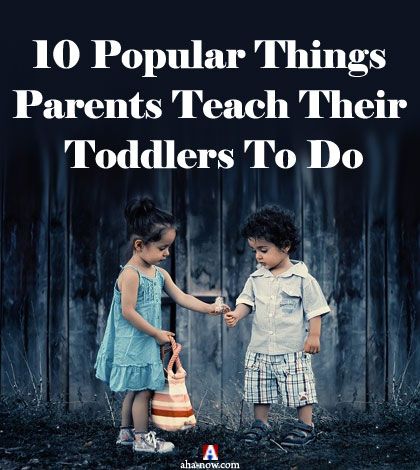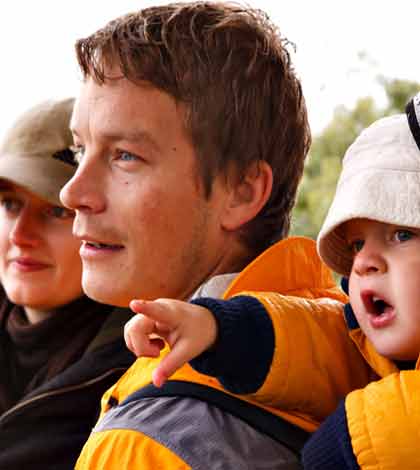10 Popular Things Parents Teach their Toddlers to Do

Table of Contents
Parents have the responsibility of being mentors to their kids and teach them life skills starting as early as being toddlers. Things that children learn in their early childhood and formative years become an unshakable part of their personality and nature. Here are some things that you as a parent can teach your toddlers to help them live a better life in the future. ~ Ed.
Unfortunately, there’s no rule book on raising your child, and a multitude of perspectives are available on the internet.
Raising children can be an extremely rewarding, and equally frustrating venture. Fortunately, there are a few popular things parents teach their children that are genuinely useful for any parenting style.
10 Things You Should Teach Your Toddlers as Parents
Children are quick learners, especially in their formative years. You should teach your kids when they are toddler things like being generous and grateful, being nice to animals, and much more.
Being Okay With Being Bored
One thing that toddlers constantly demand is your attention, and they do this for an important reason. Toddlers who are able to successfully court their parents’ attention have historically, been better adept at survival.
However, your child should also learn to start using their imagination and become part of unstructured play. Too much screen time or games can hamper your child’s development, and they should be able to start entertaining themselves.
Early Listening Comprehension
Having a child that listens to the words that you say is a luxury, and you will want to get on developing this skill as early as possible.
Nursery rhymes can help develop your child’s listening comprehension. If you only know one or two nursery rhymes then you can find more examples here to sing more to your child and that they might enjoy. There is a slew of benefits enabled by including nursery rhymes with how you educate your child.
How To Be Nice To Animals
Children love animals, but they don’t always know how to treat them. This is not their fault of course, because many their toys are designed to look exactly like animals. Teach your child how to differentiate between a toy and a living creature, and how to treat both.
Letting them observe animals in the wild, read about animals, watch media about animals, will help them when you’re ready to give them the responsibility of caring for an animal. Start off small and closely observe how they interact, giving mild and encouraging prompts when necessary.
How To Make Themselves Heard
Toddlers are not the most skilled at making themselves heard in a positive way; in many cases, they’ll use techniques like whining, or crying. Calmly talk to your toddler and tell them how to make themselves heard without being negative.
Give them examples on how to word things to you, and be positive when they make an effort. You’re going to cultivate a culture of politeness by doing it this way. Don’t shut them down immediately if they are not complying right away, just calmly suggest they word themselves another way.
Being Grateful
It might seem like you are not getting anywhere by forcing your kid to say their “thank you’s”, but research suggests that this is a great way to start teaching gratitude. Children who are forced to say that they’re appreciative of receiving something are more likely to feel those emotions. This is probably because it makes them think about what they are getting and how happy it makes them.
Gratitude can be taught but it requires patience, and your toddler needs to be at the right stage of development. Toddler’s in early stages can’t perceive objects as either “yours” or “mine” and may have an expectation to receive things.
How To Stay Positive
Humans are natural pessimists; it’s just in our nature. A fallen ice cream cone can lead to an episode of negative emotions for a child, and they need your help to learn to cope with these feelings.
Keep them positive and give them reasons to be happy, let them know that it’s okay if mistakes happen, and offer a solution such as getting another cone. Children will follow in the footsteps of your behavior and start emulating you.
Being Generous
It’s difficult to teach generosity on its lonesome, but you are definitely capable of rewarding generous behavior. If you tell your child to share their toys with others, and they have acted on what you’ve said, reward them.
When children associate generosity with something positive, they’re going to increase this behavior.
Developing Patience
Something that all children struggle with is having a tolerance to being patient. You have probably noticed adults who suffer from a similar condition. It’s important you develop a child’s tolerance to being patient with respect to their current age.
Asking them to wait 5 minutes for something is far more reasonable than expecting them to wait an hour to get a snack. Just make sure you follow through with your commitments and they will also start to get an understanding of time.
Interacting With Others
Forcing your child to play with others can feel like a cruel social experiment sometimes, but it’s important for social development. Having regular activities with other children can enhance your child’s creativity and they will start to pick up on other social skills other children have developed.
Teach your child to make eye contact with people in order to get their attention and other soft skills. Make sure that they know to give everyone the same politeness that they should be offering at home.
Saying Sorry
Forcing sorry’s feels a lot like forcing your child to say thank you, but it also has been validated with scientific literature. Children who are forced to say sorry are more likely to feel genuine guilt, and they might even incorporate their behavior into the future as well. When your child makes mistakes and their instinct is to say sorry, it can provide a great deal of satisfaction to a parent.
Apologizing is necessary for developing a child with a higher level of emotional intelligence and prepares them to handle complex feelings in the future.
Wrap Up
Whatever you’re teaching your child to do, the important thing is to remember to be patient with them. Kids aren’t always able to adhere to the instruction immediately, so give them an opportunity to prove themselves to you.
Reward their good behavior, and be understanding when they fail to meet expectations. Offer them alternatives for how they may have approached a situation, and what they may have done wrong.
Cultivating a culture of mutual respect will help your child strive to be better.
Over to you
What things do you teach to your toddler as a parent? Share your tips and experiences in the comments.
Disclaimer: Though the views expressed are of the author’s own, this article has been checked for its authenticity of information and resource links provided for a better and deeper understanding of the subject matter. However, you're suggested to make your diligent research and consult subject experts to decide what is best for you. If you spot any factual errors, spelling, or grammatical mistakes in the article, please report at [email protected]. Thanks.











The blog was so helpful, I especially like both “Saying sorry” and “Developing patience” adults should also focus on these topics.